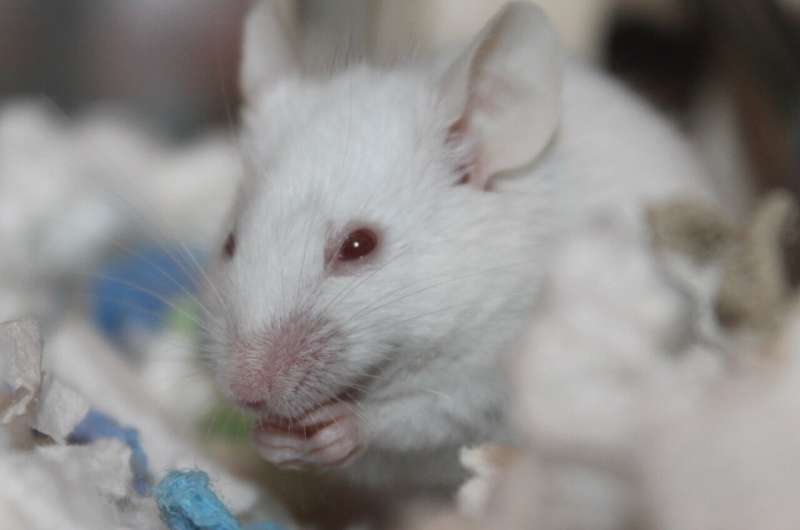This article has been reviewed according to Science X's editorial process and policies. Editors have highlighted the following attributes while ensuring the content's credibility:
fact-checked
trusted source
proofread
Flies, worms poorly predict drugs' lifespan effects in mice, study indicates

If a drug extends the lifespan of worms or flies, is it likely to do the same in mice?
Not typically based on the existing data, said Michael Bene, a sixth-year doctoral student at The University of Texas Health Science Center at San Antonio.
Bene reviewed lifespan studies from two large databases as a side project to his doctoral research at the health science center's Sam and Ann Barshop Institute for Longevity and Aging Studies. He is a student in the Integrated Biomedical Sciences Ph.D. program offered by the health science center's Graduate School of Biomedical Sciences.
In a large collection of studies called the Drug Age Database, Bene noticed a high rate of lifespan effects. Among compounds that had been tested in at least two of the three species—flies, worms and mice—more than 60% of the compounds had at least one report of the compound extending lifespan in mice and 80% to 90% showing effects in worms and flies.
"This doesn't suggest that you could choose any random chemical and have a 90% chance of making a worm live longer," Bene said. "It's more indicative that scientists typically report on drugs that extend lifespan, not on ones that don't."
Digging in
In a second analysis, Bene focused on 20 compounds that had been tested in mice in the Interventions Testing Program (ITP) conducted by the U.S. National Institute on Aging across three sites, one at the UT Health Science Center San Antonio and the others at the University of Michigan and the Jackson Laboratory.
"In this deep dive, we focused on studies that were replicated or had a higher degree of rigor," Bene said.
Twenty compounds tested for lifespan effects in mice in the ITP had also been tested at some point in flies or worms, he said.
Of the ITP-tested chemicals, 10 were also tested in the Caenorhabditis elegans Interventions Testing Program (CITP) of the National Institute on Aging. C. elegans is the species of worm studied.
The CITP tests compounds in multiple strains of worms, which is a strength. For example, a CITP study of green tea extract found that it extended lifespan in five of nine worm strains tested. Another chemical, rapamycin, extended life in only a couple of the strains.
"For flies, because there is no kind of Interventions Testing Program set up yet, we relied on our own evaluation of the literature, looking, for example, for repeated reports of lifespan effects or for studies that conflict," Bene said.
Fewer effects
In the second analysis, the positivity rate of lifespan extending effects was much lower, about half of the earlier analysis.
"Both flies and worms didn't really seem to have much predictive power for effects in mice," Bene said.
Ultimately, all research models have limitations, and the fact that flies and worms are short-lived and much cheaper to work with still make them valuable tools in aging research, he noted.
"This doesn't mean there aren't benefits to using these models," Bene said. "The main point of our study was to assess how well these results are lining up so far. All models come with caveats."
Interpretation of results must consider the model system studied
"Mike's study looked at the existing literature on interventions that extend longevity and asked whether studies in short-lived lab animals (like worms and flies) could predict the likelihood that those same compounds might extend lifespan in mice," said Bene's mentor and co-author, Adam Salmon, Ph.D., professor of molecular medicine and interim director of the Barshop Institute.
"In general, the thought has been that these are basic biology mechanisms and they should work in all, but what Mike found when looking at the data is that there was actually very little predictive value in these studies in shorter-lived animals in the existing literature," Salmon said.
Drug development typically involves animal studies in which drug candidates are tested for safety and efficacy and to determine correct dosage and mode of administration. After these studies, promising drugs move to translation in people, but most of them fail.
"What we still don't know is how these findings translate to the bigger picture of human intervention due to the nature of data available, but it's clear that interpretation of longevity studies has to consider the model organism studied," Salmon said.
More information: Michael Bene et al, Testing the evidence that lifespan-extending compound interventions are conserved across laboratory animal model species, GeroScience (2023). DOI: 10.1007/s11357-022-00722-0


















